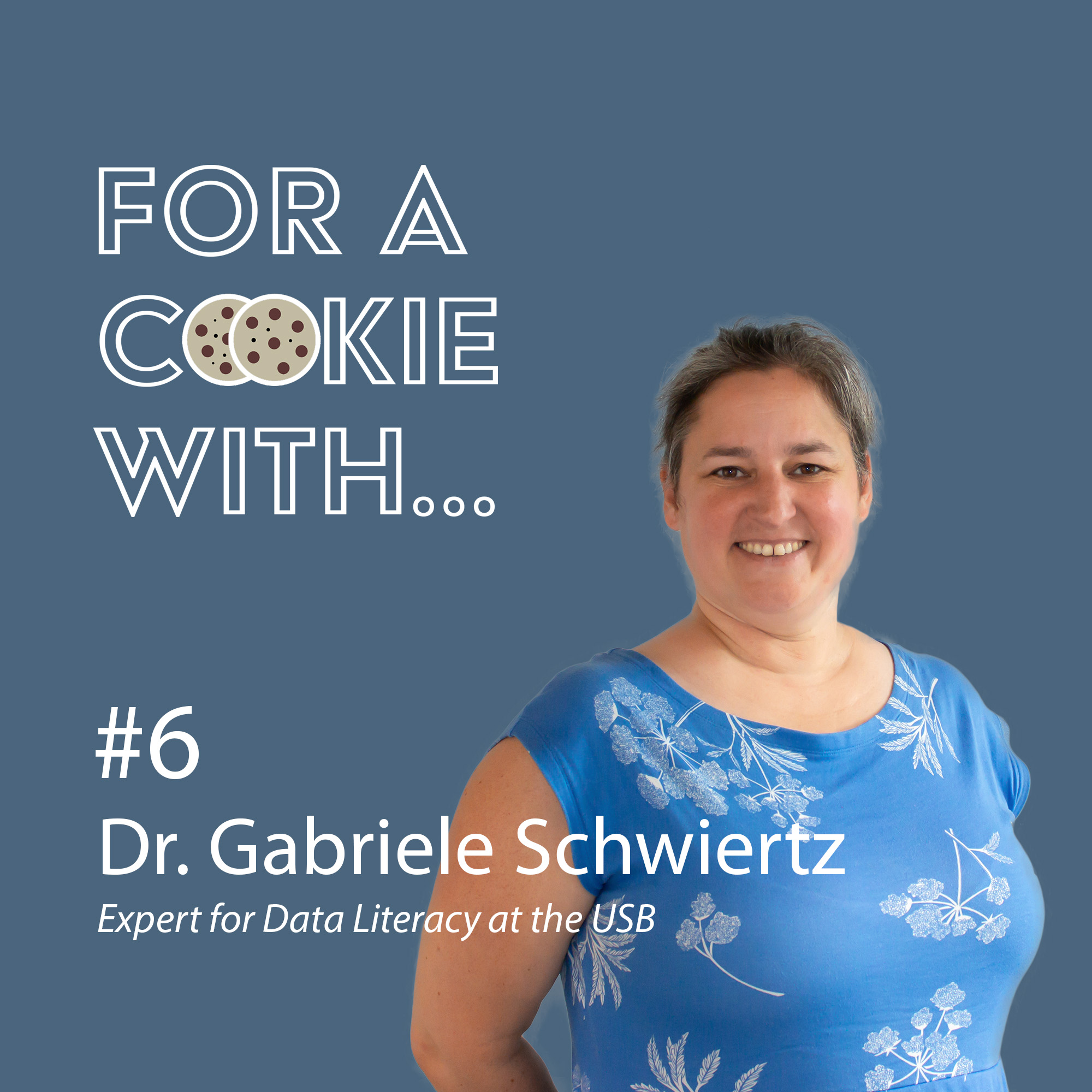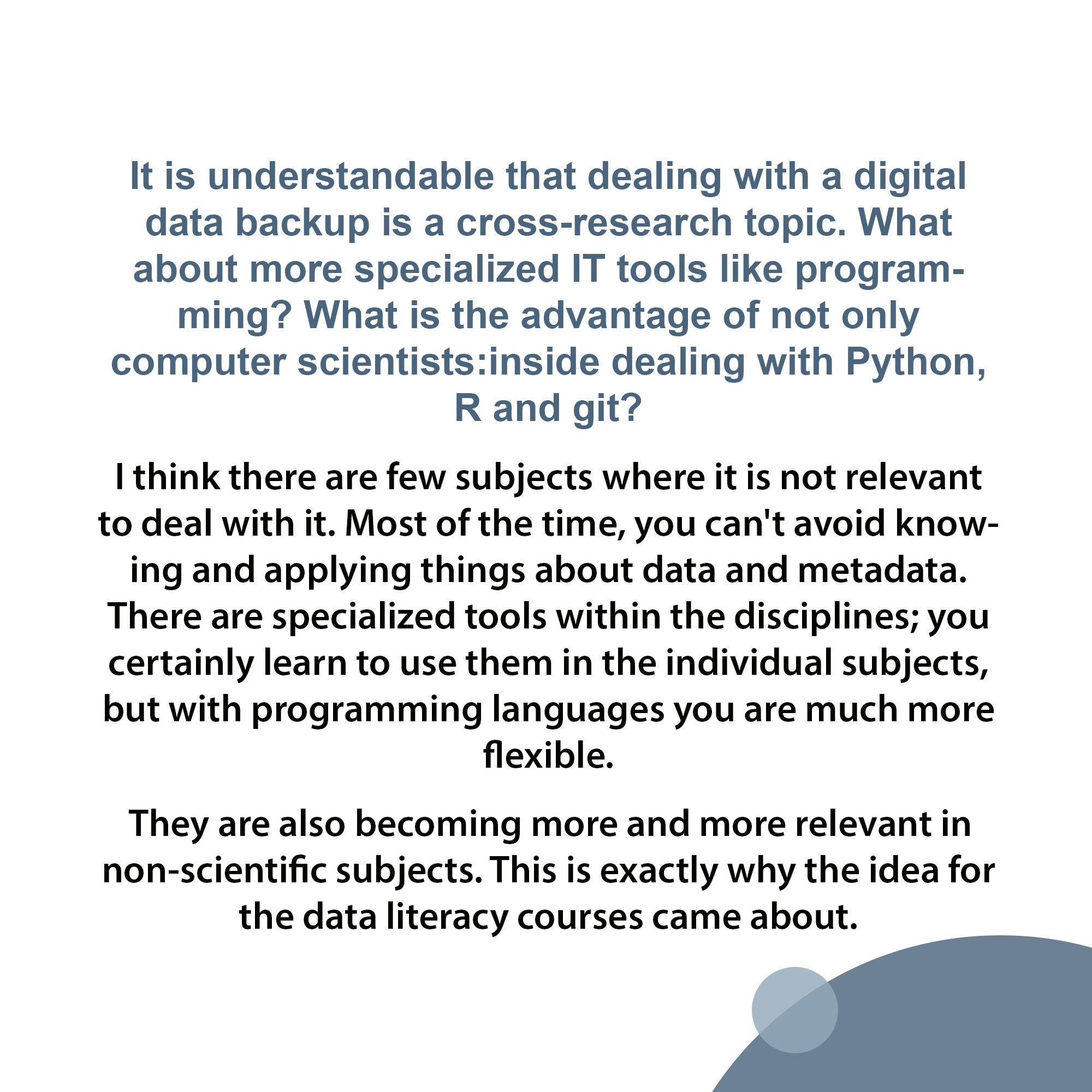For A Cookie With... #6
Dr. Gabriele Schwiertz, Expert for Data Literacy at the USB
Dr. Gabriele Schwiertz is certain that anyone who knows how to make good use of digitization within academia can only win. The expert for data literacy at the University of Cologne and the Universitäts-und Stadtbibliothek (USB) offers, among other things, courses on data literacy in „Studium Integrale“ at the Professional Center, such as "Don't be afraid of R, Python and git." The shorter courses, such as those on working with the citation program Zotero and on LaTeX, run through Ilias-Edulabs. All courses are open to students of all disciplines at the University of Cologne, because: Not only computer scientists can benefit from learning programming languages. In "For a Cookie With..." she tells us why this is so and why data literacy is that essential for the research.
Question 1:Dr. Schwiertz, you are actually a linguist specializing in phonetics and language typology, among other things. How did you come to work with IT programs?
"First of all, many scientists are fundamentally involved with topics that could be grouped under the labels of data literacy and open science. They are used to learning about new tools and workflows every now and then, regardless of their discipline.
Especially within my subject, linguistics, one of my main focuses was language documentation. One of my central tasks there was to make language recordings of the last speakers of endangered languages. In doing so, a good data backup was of enormous importance, because you often only have this one chance to work with these languages. Questions around standards and best practices in recording techniques, data formats, metadata and archiving were therefore very important, especially: How do I put data on the computer so that it can be reused? For example, one could imagine that the speech recordings could be used by other scientists - from linguistics or other subjects - for new research questions. But also: How do I make it possible that these are also well transferable into other formats? How can I best store the data digitally, prepare it qualitatively well, and archive it? How do I make it transparent for others? These are all topics that are being discussed today in the context of open science, even across disciplines. So that prepared me well for my current job."
Question 2: It is understandable that dealing with a digital data backup is a cross-research topic. What about more specialized IT tools like programming? What is the advantage of not only computer scientists:inside dealing with Python, R and git?
"I think there are few subjects where it is not relevant to deal with it. Most of the time, you can't avoid knowing and applying things about data and metadata. There are specialized tools within the disciplines; you certainly learn to use them in the individual subjects, but with programming languages you are much more flexible. They are also becoming more and more relevant in non-scientific subjects. This is exactly why the idea for the data literacy courses came about. The goal was to break down barriers and fear of contact. After all, it is often enough to learn the basics, which can be used as a basis to develop oneself in a certain direction. And that's what I want to show in the course."
Question 3: How can one imagine the courses you offer?
"There is a short introduction to the literature management software Zotero. The course is offered at regular intervals and lasts 1.5 hours. During this time, I introduce all the basic features of the program, such as how to collect the literature, how to keep track of it, how to get the references back out, and the different citation styles.
The data literacy course runs for an entire semester, with three sessions on R and three sessions on Python. The biggest part here is the introduction, where we program the same thing together, so we do the same exercises. At the end, everyone gets to choose a mini-project in which they tackle a small programming task. There is the possibility that the participants can bring their own data and tinker with it.
A new project we are hosting at the USB is the Endspurt event, which is part of the 'Ready to Hausarbeit'-campaign. This year, from September 11-13, there will be writing rooms where you can secure a space to write and edit with others. In addition, we are offering so-called 'emergency consultation hours' on Zotero and Citavi, as well as on academic writing in general, and have prepared small impulses around finishing term papers. I can highly recommend this to all students who need a little motivation boost at the end."
Question 4: What personal experiences have you had in the courses so far?
"The data literacy courses are always in high demand and quickly booked up. Actually, we could offer twice as many courses because the demand is so high. There are students from all disciplines, some with experience in programming, many with no prior knowledge at all. It's especially nice to see how people who didn't see themselves as particularly computer-savvy at the beginning suddenly really enjoy programming and then continue to learn on their own. I have the most fun in the sessions when everyone presents their projects, which range from horse protein to solar roofs to Champions League data."
Interview Slides
Nächstes Interview:

#7: Matthew William Foure, Security Analyst am RRZK
Contact
If you have any questions or problems, please contact the ITCC-Helpdesk






